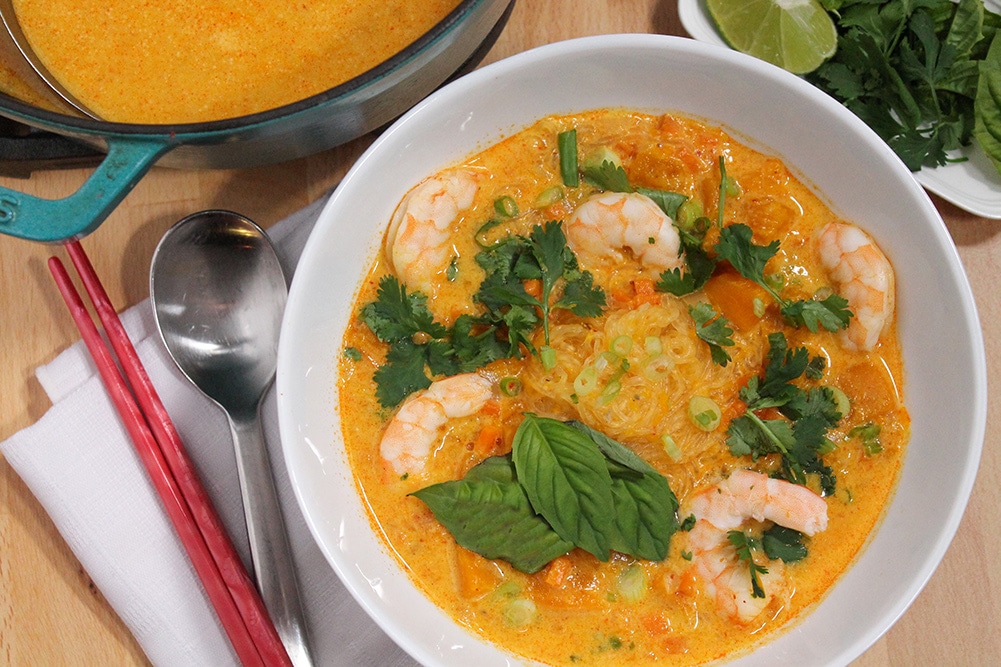
Kabocha Squash Soup Made for Slurping
Whenever I get Thai curry, I have the urge to lick my plate. It seems there’s always a pool of sauce left even after I’ve eaten all my vegetables and more-than-enough rice. I made this red curry and kabocha squash soup so that I could drink that sauce.
My thought that was by thinning out the sauce with chicken stock, I could make a super flavorful Thai curry broth that was literally meant for slurping. And that’s just what I got—between the broth and the noodles, this soup implores you to slurp!
♥ Related: Harvest Brown Rice Salad
This recipe seems complex (and the flavors are!), but it’s fairly simple to make because the curry paste packs a ton of flavor in a tiny can. The hardest part of this recipe might be finding all of the ingredients though a well-stocked supermarket should have your back. If not, I’ve linked to my favorite ingredients on Amazon below the recipe. They’re all ingredients worth having in the pantry because they easily add lots of flavor to many dishes.
Squash Soup With A Twist
This is a perfect soup to kick-off the fall cooking season; a winter squash soup with a twist. I love trying different types of squash and this one uses kabocha squash, a Japanese variety, which breaks down just slightly in the soup thickening it while still maintaining some shape.
♥ Related: Sausage Soup with Red Lentils and Kale
The kabocha squash has a velvety texture which works well with the rich coconut milk. And that curry paste breaks through all of that richness with a bold punch to your taste buds.
Give this soup a try. I give you permission to lick your bowl!
Red Curry Kabocha Squash Soup with Shrimp & Noodles
Ingredients
- 1 tbsp olive oil
- ½ small onion diced small
- 1 large carrot diced small
- 2 oz red curry paste
- 3 cups chicken stock
- 1 tbsp instant dashi powder optional
- 20 uncooked shell-on shrimp 16/20 size
- ½ kabocha squash peeled, deseeded, diced into 1/2 inch chunks
- 1 14 oz can coconut milk
- 1 tbsp fish sauce
- 1 tbsp lime juice about half a lime
- 1 tbsp granulated sugar
- 6 oz bean thread noodles cooked according to package directions
- basil, cilantro, and green onion chopped for garnish
Instructions
- In a medium soup pot or Dutch oven heat the olive oil over medium-high heat. Add the onions and carrots. Saute until soft about 5 minutes.
- Add the curry paste to the pot and cook for 2-3 minutes.
- Add the chicken stock and, if using, instant dashi powder. Bring to a simmer.
- Add the shrimp to the pot and simmer until the shrimp is cooked through about 5 minutes. Remove the shrimp from the pot.
- Add the kabocha squash to the pot and bring up to a simmer. Simmer soup until the squash is tender and slightly falling apart.
- While the squash is cooking and the shrimp are cool enough to touch, peel them and set aside.
- When the kabocha squash is cooked through, add the coconut milk and simmer for a couple of minutes to heat the coconut milk through. Add the fish sauce, lime juice, and sugar.
- To serve, pile a good handful of bean thread noodles into the bowl. Ladle on the soup. Top with shrimp. Garnish with herbs.
Notes
- I’m not going to lie, peeling the squash is a slight annoyance. I found that cutting the squash into quarters and then peeling each quarter made it easier to get a handle on the squash and go at it with my peeler. It is worth the hassle of peeling it though, I promise!
- I love the Maesri red curry paste which I bought in a pack of four on Amazon. Having this in my pantry allows me to make this soup at a moments notice; but also allows me to make all sorts of red curry dishes.
- I like the dashi powder to give an extra seafood-y umami; it’s totally optional, but I do think it adds some extra flavor.
- You can probably use any winter squash here, but I really do like the texture and flavor of the kabocha which is a bit different from something like a butternut squash.
- You could substitute rice noodles for the bean thread noodles.
Ingredients You Might Need For This Recipe
This post contains affiliate links. I may make a commission on qualified purchases from affiliate links that you click. Affiliate commissions help support this site so that I can keep bringing you great recipes, kitchen hacks, and product reviews.



 BBQ Chicken & Peach Salad
BBQ Chicken & Peach Salad
Leave a Reply